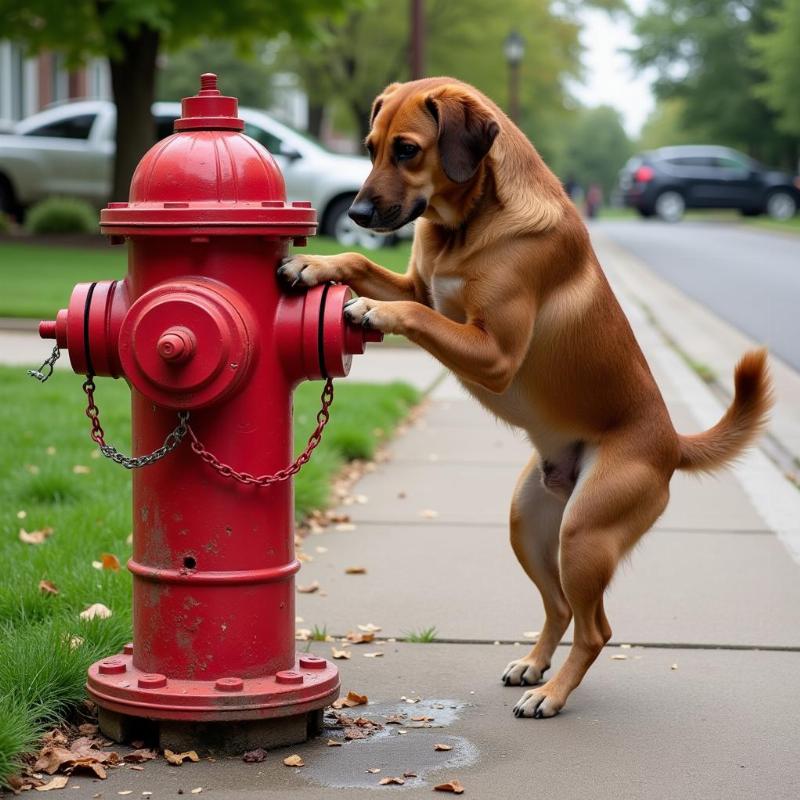Dogs have an incredible sense of smell, far superior to ours. This leads them to be drawn to certain scents that might seem repulsive to humans. Understanding what smell dogs love to pee on can help you manage your dog’s behavior, keep your yard clean, and even prevent unwanted marking inside your home. It’s not just about territory; there’s a complex olfactory world at play.
Decoding the Canine Nose: Why Specific Scents are Irresistible
Why do some smells trigger a dog’s urge to lift a leg? It’s a combination of instinct, communication, and even a bit of personal preference. Dogs use urine marking as a way to communicate with other dogs. They’re essentially leaving messages, sharing information about their sex, age, and even reproductive status. Certain scents act like an olfactory bulletin board, attracting dogs to add their own “posts.”
 Chó đang tè lên vòi chữa cháy
Chó đang tè lên vòi chữa cháy
Vertical Surfaces: The Preferred Canvas
Ever notice how dogs often prefer to pee on vertical surfaces like trees, fire hydrants, or even your prized rose bushes? This allows the scent to linger longer and be carried further by the wind, maximizing the reach of their message. The higher the pee, the bigger and more dominant the dog appears to be, at least in the canine world.
The Allure of Ammonia: A Familiar Scent
Ammonia is a common component in urine, and for dogs, it’s a familiar and easily detectable marker. While the strong smell might wrinkle our noses, it’s like a beacon for dogs, signaling the presence of other canines. It’s a key ingredient in the olfactory cocktail that drives marking behavior.
Nitrogen-Rich Environments: A Dog’s Olfactory Magnet
Areas rich in nitrogen, like fertilized lawns or areas where other animals have urinated, are especially attractive to dogs. The nitrogen content intensifies the smell of urine, making it even more enticing for a dog to add their own mark. This can be particularly frustrating for homeowners trying to maintain a pristine lawn.
Other Dogs’ Urine: The Ultimate Communication Tool
Perhaps the most powerful attractant for a dog’s pee is the urine of other dogs. It’s a direct line of communication, a way to decipher the local canine community. Each dog’s urine contains a unique chemical signature, providing a wealth of information to other dogs in the area.
Managing Your Dog’s Peeing Habits
While understanding the reasons behind your dog’s peeing preferences is important, managing their behavior is equally crucial. Consistent training, positive reinforcement, and designating specific potty areas in your yard can help curb unwanted marking. Enzyme cleaners are essential for removing the urine scent completely, discouraging repeat offenses. If you’re concerned about excessive marking, consult with a veterinarian or professional dog trainer.
Conclusion
Understanding what smell dogs love to pee on helps us appreciate their complex olfactory world and manage their behavior more effectively. By recognizing the scents that trigger marking behavior and implementing appropriate training techniques, we can foster a harmonious relationship with our canine companions. Addressing this behavior proactively contributes to a cleaner home environment and a happier, more balanced dog.
FAQ
- Why does my dog keep peeing on the same spot? Dogs often return to the same spot because the lingering scent encourages repeat marking. Thoroughly cleaning the area with an enzyme cleaner can help break this cycle.
- Is it normal for my dog to pee on every walk? While some marking is normal, excessive peeing can indicate anxiety, territoriality, or even medical issues. Consult your veterinarian if you have concerns.
- How can I stop my dog from peeing on my furniture? Consistent house training, positive reinforcement, and enzyme cleaners are key. Neutering or spaying can also reduce marking behavior.
- Why does my female dog lift her leg to pee? While less common than in males, female dogs can also lift their legs, sometimes due to dominance or hormonal influences.
- Does my dog’s diet affect the smell of their urine? Yes, a dog’s diet can influence the concentration of nitrogen and other compounds in their urine, potentially affecting its attractiveness to other dogs.
- Why does my dog pee on my air conditioner unit? The air conditioner unit may carry scents from other animals or be a strategic vertical surface for marking.
- Can I make a homemade bitter spray to deter my dog from peeing in certain areas? While some homemade solutions exist, their effectiveness varies. Consult with your veterinarian for safe and effective deterrents.
Related Articles on Beautdogs.us
- [why does my dog wait for me outside the bathroom](https://beautdogs.us/why-does-my dog-wait-for-me-outside-the-bathroom/)
- why does my dog smell like ammonia
- dog peeing on air conditioner unit
- does hound dogs pizza delivery
- bitter spray for dogs homemade
Beautdogs.us is your premier online resource for all things dog-related in the USA. We offer expert advice on dog breeds, care, and products. Whether you’re a seasoned dog owner or just starting your journey, Beautdogs.us is your trusted source for comprehensive and engaging information. Contact us today for any questions! Email: [email protected] Phone: +1 501-555-7529 Visit Beautdogs.us for more valuable insights and resources.